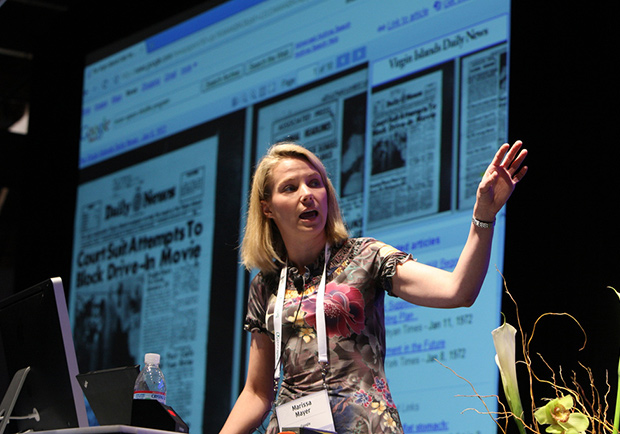The news that Yahoo—under the direction of CEO Marissa Mayer, a brand new mom herself—will revoke employees' work-from-home benefits vigorously renewed America's ongoing discussion on work-life balance. Mayer was hired, at 37 years old and five months pregnant, to turn Yahoo around, and if the Yahoos (what employees call themselves) are slacking off from home, then perhaps this is a wise move.
When rival company Google was asked how many of its employees work remotely, CFO Patrick Pinchette said: "As few as possible. There is something magical about spending time together."
I believe God himself said something similar way back in the beginning. God's declaring Adam's aloneness "not good" didn't only apply to sex and procreation. Surely the "magic" that happens when humans work together in Gardens of Eden or Valleys of Silicon had something to do with God's creating a mighty colleague for Adam.
We were made to spend time together, to work together. To put it churchily, we were "created for community," and that community includes our work. We were made to brainstorm and share and build and collaborate. We were made to come alongside and carry each others' loads and challenge and soften or sharpen each other, depending. And I believe God smiles when this happens and that more often than not, good things—or "magic" if you will—come from this God-ordained working together.
And yet, as much as I understand Mayer's decision and as much as I agree with the magic of spending time together, I wonder if she and other opponents of working from home are missing out on a more comprehensive understanding of what "working together" really looks like in the 21st century.
Working from home for the past 11 years saved my sanity by allowing me to use and stretch my non-mom gifts in the daily grind of motherhood. Aside from its sanity-saving benefits, working from home has budget-saving perks too. And I won't lie: it's wonderful being able to enjoy the flexibility to dash out to volunteer at school, to be home to wait six hours for the plumber, to not panic on snow days. It's for these reasons I thank God for jobs that come with the at-home option.
The ability to work at home has not only been good for me financially and mentally, it's been good for me as a worker. As much as I love my colleagues and in-the-flesh meetings and brainstorming sessions, as much as I love the serendipitous hallway chats that lead to bigger ideas and all sorts of "magic," truth be told: I do my best work when given time and space to be alone.
Maybe it's the introvert in me. Maybe it's the nature of my job. But we cannot deny that for many of us, the magic of good work happens when we work apart, far from the corporate campuses, from the cubicle confines. It's not just me: plenty of studies report most companies see productivity boost when they allow employees to work from home at least sometimes.
For those of us who've made a successful go at the work-from-home life, it's been because we've been trusted enough to work where we work best, whether that be in an office, in a board room, at the coffee shop, in the spare bedroom, or on a park bench. Those of us who've successfully navigated the work-from-home waters have done so because we love our work, take pride in our work, and don't choose to work from home merely because it's cheaper or easier or cozier, but because we work better there. It's also been because we haven't lost sight of the need to work together or of the magic that happens when we spend time together. It's just that successful work-from-homers understand that this can look different.
Some of the "magic of togetherness" I experience happens from secret work-related Facebook groups, where we swap ideas and seek support. Other times it comes from Google (notice: not Yahoo) hangouts or emails or good old fashioned phone calls. Those of us who do well with the work-from-home life don't eschew togetherness, we just live it out in different ways.
If this hasn't been true for the Yahoos, I hope that going back to working from work gives them a fresh sense of togetherness and community. I hope it reinvigorates them and gives them new passion and spark. I hope Yahoo morale soars, despite this dictum and despite reports that Mayer built a nursery next to her office (working from home is out, but homing from work is in!). I hope the company survives and thrives.
But more than anything, I hope this doesn't restrict society's view on how or where good work happens. I hope companies continue to empower workers to do their best work, from wherever it's best done. And I hope employees continue to understand that no matter where we work, it's how we work that matters, and that our best stuff happens when we work together—as God created us to—in all the forms "together" takes.









